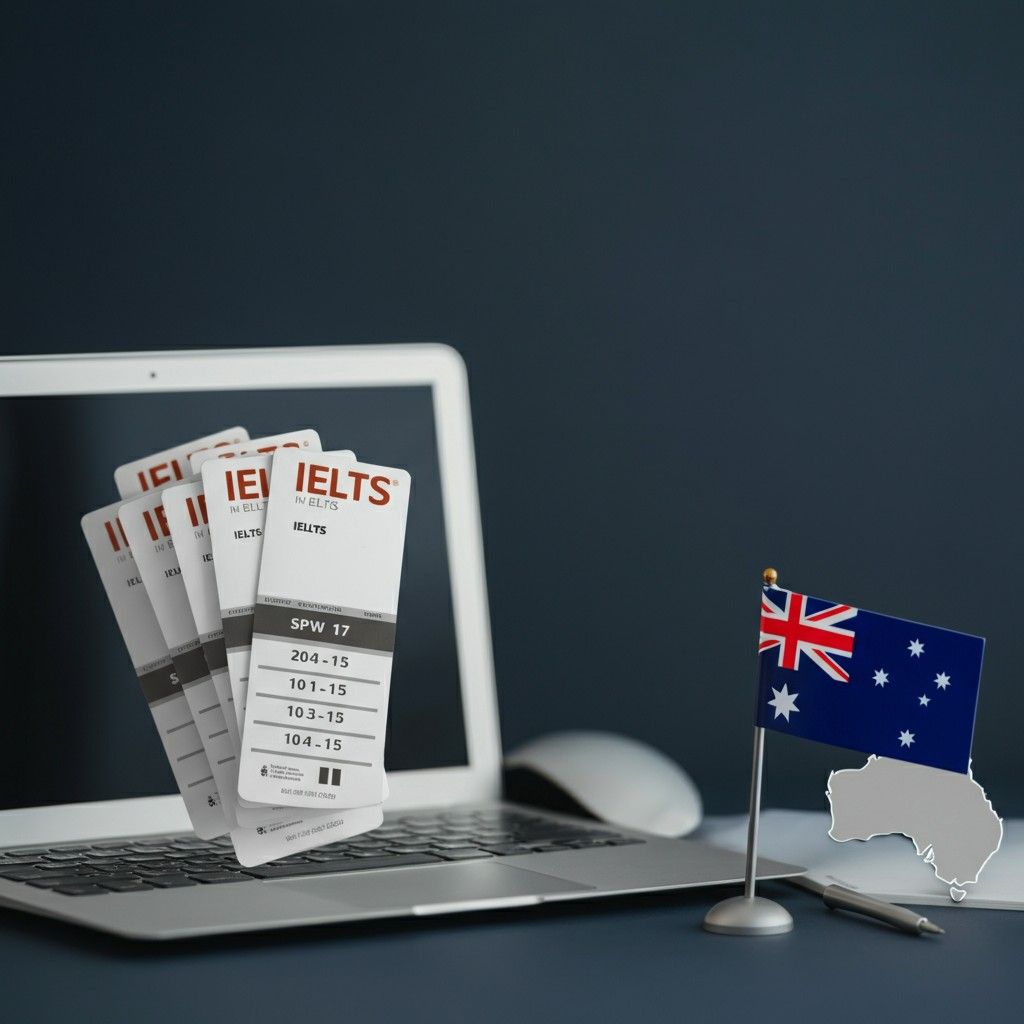A single band improvement in your IELTS test results will lead to doubled points for the Australian skilled migration program, which results in a higher likelihood of visa approval. The following guide explains both required scores and methods to reach those targets.
Latest Facts and News About Australia Work Visa IELTS Requirements
Work visas in Australia demand English language competency from skilled international workers who want to migrate there. As of May 2025, most skilled migration visas require a minimum IELTS score for an Australia work visa of 6.0 in each component- Listening, Reading, Writing, and Speaking. The points-based immigration system provides 20 points under the Superior English (Band 8+) category, significantly boosting applicant eligibility.
The IELTS One-Skill Retake allows candidates to redo one section to boost their overall score. For those applying for the Temporary Skill Shortage Visa (subclass 482), the minimum IELTS score for an Australia work visa is lower: 5.0 in each component. The Australian government has strengthened its immigration policies by providing better prospects to applicants with higher English scores.
The Australian Department of Home Affairs provides accelerated application procedures to skilled workers who maintain Superior English skills through an exceptional English proficiency assessment. The strategy welcomes premier candidates who meet essential language criteria to bond with the workplace collective.
Recent immigration data reveals that Australian immigration officials grant more application invitations to candidates who demonstrate Proficient or Superior English skills than to those with Competent English skills alone. This shows how vital effective IELTS performance has become in Australian immigration approvals.
The Australian government requires IELTS results from candidates seeking work visas in 2025
The International English Language Testing System (IELTS) is the leading accepted English qualification for Australian immigration purposes. Your IELTS score determines your qualification for work visas, and your points score determines your eligibility for skilled migration.
For most Australian work visas, you must demonstrate at least “Competent English,” which means scoring a minimum IELTS score for an Australian work visa of 6.0 in each component. Higher IELTS scores lead to supplementary points, increasing your likelihood of visa approval.
The IELTS test measures your proficiency through four essential components.
- This section (30 minutes) evaluates your capacity to comprehend spoken English when used in different scenarios.
- Reading takes 60 minutes to measure your skills in understanding written English.
- The test requires you to write (60 minutes) while assessing your proficiency in writing two assignments.
- The speaking section demands your proficiency in spoken English communication during 11-14 minutes (11 to 14 minutes).
Your performance in each component is crucial. Australian visa requirements typically specify a minimum IELTS score for an Australian work visa for each section rather than an overall average. You must perform at the required level across the four skills to satisfy visa requirements.
The connection between Australian immigration English language assessment levels and IELTS scores needs to be understood as a fundamental requirement by applicants.
- Competent English: IELTS score of at least 6.0 in each component
- Proficient English: IELTS score of at least 7.0 in each component
- Superior English: IELTS score of at least 8.0 in each component
Basic visa eligibility requirements depend on these distinctions, while the skilled migration points test gives maximum points based on achieving these distinctions.
Minimum IELTS Score for an Australia work visa Requirements by Visa Type in 2025
Work visas in Australia demand different minimum IELTS scores for their requirements. Here’s a comprehensive breakdown of the minimum IELTS score for an Australian work visa needed for each visa category:
Skilled Independent Visa (Subclass 189)
Foreign skilled professionals who apply for the Skilled Independent visa receive permanent residency to settle anywhere in Australia. For this visa, you need:
- Minimum IELTS score for an Australia work visa: 6.0 in each component (Listening, Reading, Writing, Speaking)
- During points-based system assessments, additional Points are given to applicants with IELTS scores higher than 7.0 and 8.0.
- A skills assessment linked to your selected occupation is one of the basic requirements.
- All applicants need to achieve at least 65 points through the points test.
The competition for this visa remains high because every invitation round selects applicants with higher point scores. Strong English proficiency is significant when applying for migration through Australia’s visa programs.
Skilled Nominated Visa (Subclass 190)
This state-nominated permanent residency visa shares similarities with the Skilled Independent visa through the following requirements:
- Minimum IELTS score for an Australia work Visa: 6.0 in each component
- The addition of state nomination brings an additional 5 points that count toward your total points score.
- As part of the application, candidates must fulfil all criteria set by the state or territory that gave them their nomination.
The in-demand occupations lists and additional English language requirements of Australian states and territories differ from those of the Department of Home Affairs’ basic standards.
Skilled Work Regional (Provisional) Visa (Subclass 491)
This regional visa requires:
- Minimum IELTS score for Australia work visa: 6.0 in each component
- Family sponsorship or state/territory nomination
- Applicants must pledge to stay in a specified Australian regional zone while working and studying there.
Permanent residency becomes accessible through this visa if you spend three years working in regional Australia after obtaining it.
Temporary Skill Shortage Visa (Subclass 482)
The work visa allows English language requirements to be fulfilled at a reduced level.
- Minimum IELTS score for Australia work visa: 5.0 in each component
- Apart from specific professions, there is a demand for higher English proficiency.
- The visa program includes an up to two-year maximum duration through short-term and medium-term streams lasting up to four years.
Permanent residency can be obtained through the medium-term visa stream after three years of residence, but the short-term stream does not provide this option.
Employer Nomination Scheme Visa (Subclass 186)
The employer-based permanent residency visa includes these requirements:
- Minimum IELTS score for Australia work visa: 6.0 in each component
- The visa requires approval from an Australian-based employer to be an employee.
- This visa is accessible through three streams: Direct Entry, Temporary Residence Transition and Labour Agreement.
The requirements of the Temporary Residence Transition stream vary depending on previous work experience in Australia under a temporary visa condition.
Sponsored Regional Visa under Subclass 494.
For this regional employer-sponsored visa:
- The visa requires candidates to achieve at least 6.0 in each section of the IELTS test.
- An approved employer based in regional Australia must propose the candidate for nomination.
- Candidates can obtain permanent residency if they work in regional Australia for three years.
Occupations such as healthcare, education, and particular specialised fields need higher English requirements because of job safety standards and patient protection needs.
Latest IELTS Scores and the Australian Points System in 2025
The Australian points-based immigration program uses your IELTS score as a vital assessment criterion. The English proficiency level determines your points as follows:
| English Level | IELTS Score | Points Awarded |
| Superior English Australia | 8.0+ in each component | 20 points |
| Proficient English Australia | 7.0+ in each component | 10 points |
| Competent English Australia | 6.0+ in each component | 0 points |
Most skilled visa candidates must achieve at least 65 points to qualify. The minimum requirement for basic English proficiency is Competent English (6.0+), yet it does not result in additional points. A superior or proficient score (8.0+ or 7.0+) in English-based tests will result in substantial point gain and better application invitation opportunities.
Other aspects that earn points through the points system include:
- Age (maximum 30 points)
- Educational qualifications (maximum 20 points)
- Work experience (maximum 20 points)
- Australian study experience (maximum 5 points)
- Community language skills (maximum 5 points)
- Partner skills (maximum 10 points)
- Regional study (maximum 5 points)
Successful Australian skilled migration candidates must achieve the maximum possible points because competition is high. Your IELTS score improvement from Competent to Proficient level grants you 10 points, but reaching the Superior English results in 20 points that match PhD education or the preferred age group.
The point total for a bachelor’s degree holder and a five-year work experience 32-year-old applicant can be calculated at approximately:
- Age (25 points)
- Education (15 points)
- Work experience (10 points)
- Total: 50 points
This applicant would fail to achieve the 65-point threshold because of their Competent English level. The application becomes more competitive when the applicant attains Proficient English because it gives them an additional 10 points (total: 60 points) while Superior English earns 20 more points (total: 70 points).
IELTS Academic vs. General Training for Australian Work Visas in 2025
The selection of the correct IELTS test format plays a significant role in obtaining an Australian work visa.
IELTS General Training
- Suitable for most work visas and permanent residency applications
- Focuses on everyday English skills in social and workplace contexts
- Tests practical communication skills for general work environments
- Immigration authorities at the Department of Home Affairs recognise this test for their purposes.
- The Reading section in General IELTS is less challenging than Academic IELTS.
IELTS Academic
- The regulatory bodies need this test to approve registration for specific medical professionals, nurses, accountants, and engineers.
- The test determines academic and professional language competencies.
- The tasks involve advanced written material and analytical writing challenges.
- Professional registration, together with a visa application, may require this document.
- Professionals in regulated fields need this test as a requirement.
Most Australian work visa applications accept IELTS Academic and General Training versions. Professionals should verify their registration requirements even if they apply for general training, because their profession might need academic training for professional registration.
Nurses seeking Australian work visas should use IELTS General Training for their submissions. Yet, they must also take IELTS Academic when registering with the Nursing and Midwifery Board of Australia.
Patient professional groups need IELTS Academic results for registration and other specified criteria.
- Doctors and medical specialists
- Nurses and midwives
- Dentists
- Pharmacists
- Physiotherapists
- Occupational therapists
- Veterinarians
- Teachers
- Accountants
- Engineers
Research the English requirement for your visa and chosen occupation before booking a test, because multiple tests could be necessary.
Alternative English Tests Accepted for Australian Work Visas in 2025
Numerous alternative English language tests, except IELTS, are valid options for Australian immigration applications.
| Test | Competent Level | Proficient Level | Superior Level |
| IELTS | 6.0 in each | 7.0 in each | 8.0 in each |
| TOEFL iBT | 12 (Listening), 13 (Reading), 21 (Writing), 18 (Speaking) | 24 (L, R), 27 (W), 23 (S) | 28 (L), 29 (R), 30 (W), 26 (S) |
| PTE Academic | 50 in each | 65 in each | 79 in each |
| Cambridge C1 Advanced (CAE) | 169 in each | 185 in each | 200 in each |
| Occupational English Test (OET) | B in each | B in each | B in each |
The Department of Home Affairs created standardised equivalence scores across different tests for accurate assessment.
TOEFL ibt (Test of English as a Foreign Language Internet-Based Test)
The TOEFL ibt test is offered universally to check your English university-level language ability. The test tests your ability to handle listening, reading, speaking and writing processes together.
PTE Academic (Pearson Test of English Academic)
The PTE Academic checks your ability to understand spoken audio while reading texts and speaking and writing responses. Most test-takers pick this test because of its benefits.
- You receive your test results before the two-day mark
- A computer system handles the speaking tasks instead of a human examiner
- Testees view the exam as more unbiased because of its automatic scoring system.
Cambridge English Advanced (CAE)
C1 Advanced stands as the designation given by Cambridge Assessment English for its worldwide recognised examination. The test is built for accomplished students who need to show advanced English skills.
Occupational English Test (OET)
The OET exists to evaluate medical English skills among healthcare professionals. Healthcare specialists such as doctors, nurses, dentists and pharmacists find the occupational English Test particularly helpful. Each testing program follows the precise format that healthcare professionals must meet.
Before selecting an alternative test, you should assess three critical factors.
- Test availability in your location
- Your skills and skill level determine which test you should take.
- Cost and frequency of test sessions
- How quickly do you need results
- Any specific requirements for your profession
Experts Tips to Achieve the Required IELTS Score for an Australia Work Visa in 2025
Reaching the minimum IELTS score for an Australia work visa takes planning and consistent practice. These methods will help you achieve your goals during the process.
1. Understand the Test Format
- Get accustomed to the four test sections: Listening, Reading, Writing, and Speaking.
- Take official IELTS test questions to learn how to answer each type
- Study practical ways to control your time usage in all test parts
- Study the specific ways your Writing and Speaking skills will be evaluated.
The test structure information relieves stress by letting you focus on showing your English abilities instead of studying instructions.
2. Focus on Your Weakest Areas
- Use a diagnostic test to determine your good and poor points in English skills.
- Devote more practice time to things that cause you difficulties
- Focus your effort on resources that help you learn individual English skills better
- Use practice tests to follow your improvement steps
Specialised attention works better than covering all test areas. Devote more study time to Writing Task 2 aspects like composition framework and academic vocabulary when you have problems with this area.
3. Use Official Study Materials
- Pay for legitimate IELTS study materials from the British Council or IDP
- Use the accurate test materials from the Cambridge IELTS series and its actual exam samples
- Include online courses from known sources, plus practice tests
- Work with the Official IELTS Practice Materials book and access test examples from qualified examiners.
Manufacturer-approved content creates tests which match actual conditions to help you train best.
4. Consider Professional Preparation
- Taking an official IELTS preparation class offers the best learning experience.
- Get expert IELTS tutoring to get a specific assessment of your work
- Learn from others through both group discussions and speaking to language partners.
- Take part in official IELTS events to learn from professional instructors.
Professional help will find educational problems you may not see and recommend learning habits that suit you.
5. Practice Regularly and Consistently
- Establish a study plan and follow it every day
- Practice all four skills regularly
- Practice complete IELTS exams as timed tests to prepare effectively
- Study your errors to make better choices in your studying.
Daily study periods help students learn more than several lengthy sessions without preparation.
6. Utilise the One-Skill Retake Option
- High achievers can retake just the skill component they did not reach through the IELTS One-Skill Retake service.
- When you retake only the section you need to improve, you save both time and test-taking expenses.
- Dedicate all your training efforts to strengthening your weakness in that area.
- Apply specialised study material for that skill area.
Official test preparation materials and complete test simulations help students hit their score goal by 30%. Consistent preparation for 6-8 weeks ahead of the test date produces better results than preparing for a shorter time.
Latest Section-Specific Strategies for Minimum IELTS Score for an Australia Work Visa in 2025
For Listening:
- Study speaking with different English accents from Britain, Australia and America.
- Improve note-taking skills
- Master detecting answers by reading the surrounding text.
- Learn to spot definite listening information correctly.
For Reading:
- Improve skimming and scanning techniques
- Practice identifying main ideas quickly
- Develop better ways to use your available time
- Master key words about typical IELTS topic areas
For Writing:
- Understand and apply the proper design for the Data Description Task and the Essay Task writing
- Learn to analyse questions properly
- Practice planning before writing
- Create a collection of valuable speaking and writing elements for the test
- Ask someone to review what you have written whenever you can
For Speaking:
- Use voice recording to find ways you can get better at speaking IELTS.
- Speak openly about the subject areas seen in IELTS tests
- Discover practical ways to handle the three parts of your speaking test
- Improve how you speak naturally while using good pronunciation and many words
Recent Changes in IELTS Requirements for Australian Work Visas in 2025
The Australian government system changes its immigration rules frequently. Here are some recent changes:
Increased Emphasis on English Proficiency
Higher IELTS test scores can now grant applicants more points in the skilled migration system, which gives English speakers a more significant advantage. The Department of Home Affairs stresses that practical English ability leads to better employment opportunities and faster progress into the Australian community.
Introduction of One-Skill Retake Option
IELTS One-Skill Retake enables test takers to retest a single test section to enhance their scores. This change acknowledges that many applicants may have uneven skills profiles and provides a more flexible pathway to meeting the minimum IELTS score for an Australia work visa.
Higher Points for Superior English
The new IELTS scoring system advantages persons with outstanding English language skills by awarding them 20 points. Australia wants to hire professionals who excel and will begin working immediately.
Temporary Skill Shortage Visa Changes
Australia offers different visa types with unique English language standards, including short-term and medium-term programs. The medium-term stream needs advanced English skills because it serves as a path to permanent Australian residency status.
Digital IELTS Testing Options
Australia has added new ways to take the IELTS test, such as computer-delivered and IELTS Online, to help applicants during the global trends and the COVID-19 pandemic.
Industry-Specific Requirements
Several industries have additional English assessment criteria beyond the standard visa conditions. Healthcare staff must prove their expertise in patient communication during their assessments.
Fast-Track Options for High English Achievers
Visa category candidates with Superior English skills can now have their applications processed faster because of their strong language skills.
The changes show that Australian immigration needs skilled professionals who score highly on their English language tests.
Latest Common challenges and how to Overcome Them in 2025
The road to success on the IELTS test for Australian work visas presents common difficulties for all test-takers. Here’s how to tackle them:
Time Management in Reading
The Reading section proves most difficult because applicants need to answer 40 questions within 60 minutes.
Solutions:
- Learn to find specific information fast by skimming and scanning text documents.
- Start by reading the questions first before opening the reading passages.
- Devote 20 minutes to each reading section during your practice sessions
- Study how to locate essential words in test questions
- Devote a limited time to each question instead of spending excessive time on one.
- Take timed practice tests regularly
Writing Task 2 Structure
Most test-takers have difficulties constructing their ideas properly in their essays.
Solutions:
- Determine how to write an essay through the opening, support segments and final remarks.
- Devote five minutes to outlining your essay before composing it.
- Give each paragraph a direct opening statement
- Support your points with examples
- Develop better text connections through linking words.
- Review sample essays to understand examiners’ evaluation criteria when scoring them.
Speaking Fluency and Confidence
High levels of anxiety during the Speaking test make test takers hesitate and give fewer answers.
Solutions:
- Set aside daily time to speak English, even when you only have 10 minutes available.
- Use your recorded voice to see what you need to improve
- Practice typical speaking themes before the test starts
- Develop methods to purchase enough time to think before answering
- Teach your English skills to a partner who speaks the language.
- Focus on your speech challenges when speaking English.
Listening to Different Accents
Different English accent patterns during the Listening test make it tough for test-takers to handle.
Solutions:
- Watch media content from many different English speakers.
- Practice with the IELTS official listening exercises
- Make a plan to recognise which details you should focus on listening for
- Practice note-taking techniques
- Master the sounds spoken by Australians
Vocabulary Limitations
A small vocabulary hinders performance in every part of the test.
Solutions:
- Study English words directly from real-life content instead of word lists.
- Develop your vocabulary from the IELTS test topic areas.
- Put new words into spoken sentences for practice.
- Study English information through newspapers, magazines and books.
- Learn word families (noun/verb/adjective forms)
- Keep a notebook to list and study new words at regular intervals
Using a timer while practising and looking at your errors will enhance your results and boost your self-confidence for your test. Successful test-takers advise establishing a study group or maintaining a study partnership to keep their motivation high throughout preparation.
Build Your IELTS Skills in 6 Weeks Through Proper Preparation in 2025: Experts’ Strategies
A structured study plan can make all the difference in achieving your target minimum IELTS score for an Australia work visa. You need 6 weeks to develop your preparation strategy as follows:
Week 1: Assessment and Familiarisation
- Test your present abilities with an entire test practice session
- Master the exam routine and different test questions ahead of time
- Craft your study timetable from the parts you need to improve first
- Gather study materials and resources
Week 2: Listening and Reading Focus
- Use official study examples to improve your listening skills.
- Understand how to browse a text using skimming and scanning methods.
- Study essential words connected to regular IELTS content areas.
- Complete timed practice sections
Week 3: Writing Development
- Learn the proper format for writing about graphs or charts at Task 1.
- Practice Writing Task 2 essay structures
- Learn to analyse writing questions
- Ask for an evaluation of your recent two essay drafts.
Week 4: Speaking Improvement
- Rephrase your answers during tests of the whole speaking experience.
- Record yourself speaking and check your performance
- Work on pronunciation and fluency
- Develop valuable words and phrases for everyday speaking topics
Week 5: Integrated Practice
- Practice all test sessions within the set time limits
- Look at your errors and build knowledge from them.
- Devote most of your study hours to fixing your most problematic areas in the test.
- Practice test-taking strategies
Week 6: Final Preparation
- Complete your final practice test to see your current level
- Review key vocabulary and expressions
- Use relaxation exercises when preparing for the test day
- Make sure you have all the necessary items ready to take the test
You will prepare effectively for all test parts by concentrating more time on the subjects requiring more attention.
Conclusion
Meeting the minimum IELTS score for an Australia work visa is essential for your application. You will require 6.0 scores in every section for most work visas and a minimum of 5.0 for the Temporary Skill Shortage visa. Striving for IELTS test results above 7.0 or 8.0 enhances your opportunities for visa acceptance.
Learning visa qualifications helps you prepare better and adapt to Australian work opportunities to improve your acceptance odds. Good English abilities are necessary to meet visa requirements and will help you succeed at work and in Australian society.
Meeting your needed IELTS score demands hard work, but you can succeed through adequate preparation and positive thinking. Many applicants each year fulfil these standards and achieve their goal of working in Australia with consistent dedication.
Your English skills from IELTS training will benefit you throughout your professional life in Australia.
FAQs (Frequently Asked Questions)
Q1. What score on the IELTS must you reach to qualify for an Australian work visa?
Ans. The minimum IELTS score for an Australian work visa varies by visa type. To qualify for most Australian skilled migration visas, you need at least 6.0 points in all four areas that measure Listening, Reading, Writing, and Speaking. To obtain the Temporary Skill Shortage visa 48,2, applicants must reach at least 5.0 in every language test area.
Q2. What work visa options are available to me in Australia when my IELTS score is 5.5?
Ans. Having 5.5 IELTS points will restrict your employment visa possibilities in Australia. Permanent residency visa applications need at least 6.0 marks, while a Temporary Skill Shortage visa permits you to enter with 5.0 marks in each part.
Q3. What score will my IELTS results bring me in the Australian points test?
Ans. A candidate who achieves 6.0 in all IELTS components receives zero points, 7.0 in all components earns 10 points, and 8.0 in all components brings 20 points.
Q4.What IELTS test should I select for my Australian work visa application?
Ans. Most Australian work visas recognise IELTS Academic and IELTS General Training test types. If you aspire to work professionally as a doctor, nurse, or engineer, you will require IELTS Academic for registration.
Q5. What action occurs when my visa application fails the minimum required IELTS score?
Ans. Your visa application may be rejected if you don’t meet the minimum IELTS score for an Australian work visa. When you wish to improve one test area, you can opt for the IELTS One-Skill Retake service or retake the whole test.










